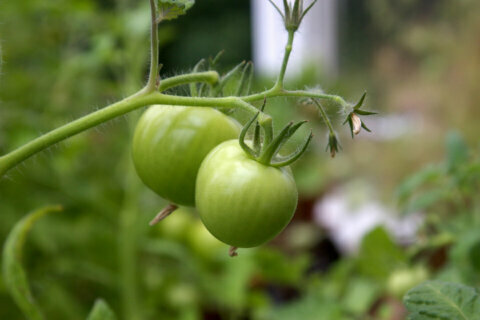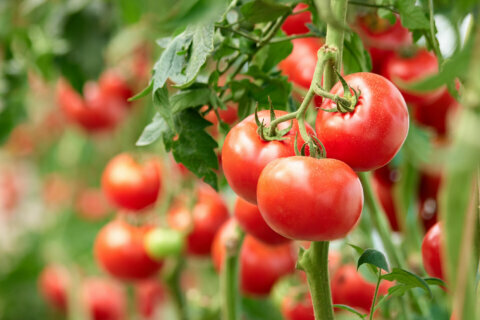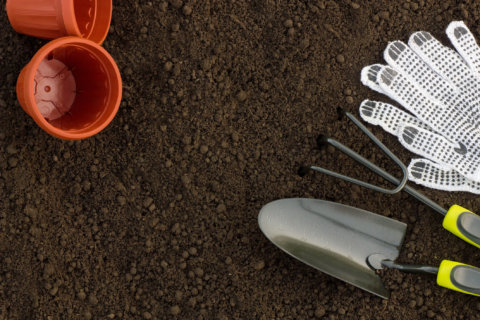Yes, it’s FINALLY safe …
… to plant warm weather crops like peppers and tomatoes outdoors. It seems like it took forever to reach this point, but there are two reasons for this feeling:
- It takes forever to do anything these days, and three times forever if the journey involves toilet paper.
- Despite all the cuteness about Mother’s Day plantings, May 15 has always been the “safer” day to plant summer gardens.
- No date is safe. You must look at the 10-day forecast and hold off if nights in the 30s or low 40s are predicted.
And yes, that is three reasons. I thought you should know that you’re about to take advice from a man who can’t count to two.
It takes a hard tomato …
Following last week’s frigid blasts (my volunteer potatoes froze! Sob!), the 10-day weather forecast for the D.C. area finally shows nights consistently in the 50s. I checked several outlying suburbs and couldn’t find a single night below 45 or so. That means that tomatoes, peppers and the other crops of summer can safely go outside.
If you have had your starts indoors waiting until the snows of May finally stopped, I suggest you “harden them off” — which does not mean sending them to a military school. It just means letting them sit outside for a few days in their pots before you actually plant them in the ground.
Keep those started plants well-watered and use this time to examine your garden for the perfect spots for your precious plants.
Top tips for tomato success
- Tomatoes should be planted in an area that gets morning sun and six to eight hours of sun daily.
- Tomatoes should not be planted in the same spot three or more years in a row or they will succumb to a soil-borne wilt. Plant them at least 3 feet away from that spot and they will thrive. You can safely plant other crops in that original spot, and tomatoes can return there after a two- or three-year absence.
- At planting time, pull off the lower leaves of each tomato so that three-quarters of the stem will be underground, where it will grow auxiliary roots.
- If you have eggshells, place the crushed particles of a dozen dried eggshells in the planting hole. Otherwise, toss in a half cup of an organic plant food designed for tomatoes, such as Espoma Tomato Tone or Gardens Alive Tomatoes Alive. They have the extra calcium needed to prevent blossom end rot.
- Otherwise, only fill the hole back up with the crappy soil you removed so that the roots have no choice but to grow into it.
- Then improve the soil on the surface with 2 inches of the finest compost you can beg, borrow, steal or buy.
- Then support the vine. Compact determinate plants won’t grow taller than 5 feet and can get by with a standard tomato cage. They may be labeled “bush” or “good for containers.” They generally have shorter days to maturity. Indeterminate tomato plants (longer days to maturity) will grow like a surly teenager and need to be kept inside a sturdy 5- or 6-foot-high cage — not unlike actual surly teenagers.
And if you planted early and got frosted
Many of you jumped the gun and planted your crops of summer just in time for them to endure nights that were cold, frosty or just plain freezing. If they now look like the dog’s breakfast, pull them out, apologize and replace them.
Or have nothing to eat when the Zombie Apocalypse hits. Your choice.
And Finally …
- Always plant tomatoes deeply but plant everything else at the same height as it was in the pot.
- Don’t improve the soil in the planting hole or the plant won’t grow well. Instead, improve the soil by spreading an inch or two of high-quality compost on top, around the newly installed plant.
- Plant in the evening, not first thing in the morning, to lessen transplant shock.
- Water deeply at the base of the plant after planting.
- No matter what, do not use any kind of wood mulch in your vegetable garden — or the zombies’ll get cha!
Mike McGrath was editor-in-chief of ORGANIC GARDENING magazine from 1990 through 1997. He has been the host of the nationally syndicated public radio show “You Bet Your Garden” since 1998 and WTOP Garden Editor since 1999. Send him your garden or pest control questions at MikeMcG@PTD.net.







